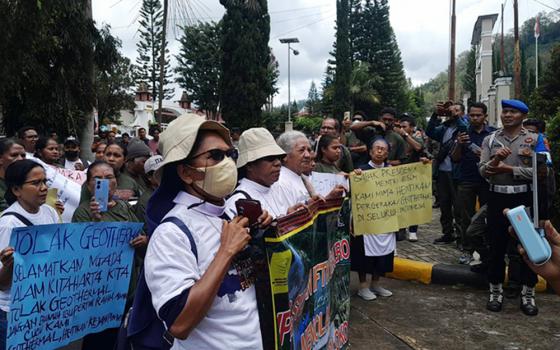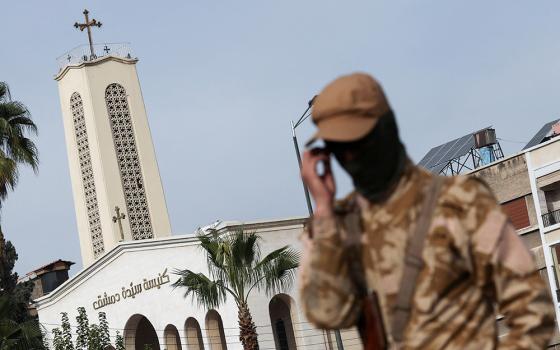WHERE MERCY FAILS: DARFUR’S STRUGGLE TO SURVIVE
By Chris Herlinger and Paul Jeffrey, foreword by Archbishop Desmond Tutu
Published by Seabury Books, $25
Two pictures side by side take you up short in this stark little book about the horror that is Darfur. Two boys so similar they could be brothers, both wearing necklaces of shell and stone, stare out from the page. But, the caption tells us, they hail from warring groups -- one is “African,” the other “Arab,” one lives in a displacement camp, the other in his home village.
If you guessed which was which from their faces, you’d get it wrong. It’s not color that’s pitting one group against another in this huge region in the western part of Sudan, and it’s not religion -- both sides are Muslim -- it’s the fact that the Khartoum government supports the rape and killing of the “Africans” by the “Arabs.” This is a political massacre, one that should be stopped by international governmental organizations.
That’s the basic message of Where Mercy Fails. Neither writer Chris Herlinger nor photographer Paul Jeffrey pretends to be “objective” about what they are reporting. Each has worked with humanitarian organizations in Darfur and both are horrified by what they see there year in and year out. Jeffrey, a photojournalist, is also a United Methodist missionary. His shots of the displacement camps (people driven out of their homes are not technically refugees when they remain in their own country), and the abandoned villages the camps dwellers have fled, tell many of the basic “facts” of the situation. Determined to reflect the strength of his subjects, Jeffrey insists, “Most human beings bear an enormous reserve of dignity, even when raped, robbed, and chased from their homes and herded into camps where they have to depend on the compassion of others to survive.”
 Rather than images of misery, Jeffrey shows people at prayer, mothers caring for their children, women and girls cooking and carrying water, schoolteachers shepherding their charges, children clutching their notebooks -- all inside the confines of overcrowded, patched-together camps. Despite the resilience -- and in some pictures even palpable joy -- of these proud people, we view this hard-to-come-by documentation of displacement in Darfur and know it’s got to end.
Rather than images of misery, Jeffrey shows people at prayer, mothers caring for their children, women and girls cooking and carrying water, schoolteachers shepherding their charges, children clutching their notebooks -- all inside the confines of overcrowded, patched-together camps. Despite the resilience -- and in some pictures even palpable joy -- of these proud people, we view this hard-to-come-by documentation of displacement in Darfur and know it’s got to end.
The captions tell the basic story. Rebels supported by the “Africans” hatched an insurgency against the Khartoum government in 2003; the government, already embroiled in a north/south civil war, enlisted “Arab” militias -- the infamous “Janjaweed” -- to fight the rebels. The result: up to 400,000 people killed, countless women routinely raped and more than 2.7 million displaced. Workers from humanitarian groups, often in danger themselves, battle to keep the camp residents fed, healthy, educated and minimally employed. United Nations efforts to quell the violence by sending in African Union troops, also pictured here, have been thwarted by the international community’s unwillingness to take on the Sudanese government.
 That recitation of facts, though useful, fails to ask the nuanced and somewhat anguished questions laid out by Chris Herlinger in his terse text. A freelance journalist whose coverage of Darfur has won awards, including some for the National Catholic Reporter, Herlinger attended Union Theological Seminary and has interrupted his journalistic career with fellowships at Harvard and Yale Divinity Schools. He raises complex issues here: whether this is genocide and, if so, then what; whether this is the first climate-change war; what is the political effect of humanitarian aid; is reconciliation among the warring factions possible; and, most important, can anything be done about Darfur?
That recitation of facts, though useful, fails to ask the nuanced and somewhat anguished questions laid out by Chris Herlinger in his terse text. A freelance journalist whose coverage of Darfur has won awards, including some for the National Catholic Reporter, Herlinger attended Union Theological Seminary and has interrupted his journalistic career with fellowships at Harvard and Yale Divinity Schools. He raises complex issues here: whether this is genocide and, if so, then what; whether this is the first climate-change war; what is the political effect of humanitarian aid; is reconciliation among the warring factions possible; and, most important, can anything be done about Darfur?
Herlinger engages in the ongoing debate about whether the mass killings constitute genocide but seems finally to side with the European U.N. worker who argues: “Discussing semantics has wasted time; stopping the violence should be our objective.” Organizations like Save Darfur and the Genocide Intervention Network have persistently pressured the world community toward that goal. Laments Mark Hanis, founder of the Genocide Intervention Network, an end to the killing “is still a long way off.”
The political complexity is compounded.
 Herlinger examines theories around claims that the nomadic “Arabs” don’t want to stop the violence that causes the “Africans” to desert their villages; that “drought has forced nomads to change migration patterns and has set them against established farming communities”; that after years of confinement in camps the “Africans” show “increasing support for the rebel cause.”
Herlinger examines theories around claims that the nomadic “Arabs” don’t want to stop the violence that causes the “Africans” to desert their villages; that “drought has forced nomads to change migration patterns and has set them against established farming communities”; that after years of confinement in camps the “Africans” show “increasing support for the rebel cause.”
Not theoretical is the fact that with no halt to the violence in sight, the international humanitarian community, mostly faith-based, has stepped in with massive assistance and considerable doubts. Herlinger quotes one activist who said, “When you’re feeding the people who fled the storm, you’re not stopping the storm.” And the author is clearly troubled that by “treating Darfur not as a political problem but as a humanitarian problem,” governments have been let off the hook when political or military action might have prevented many deaths. (This book was written before Sudan threw out most humanitarian organizations in March 2009 after the International Criminal Court issued a warrant for President Omar Hassan al-Bashir’s arrest. Until the groups were able to get back in, estimates of more than a million people cut off from food, water or health care dramatically demonstrated how essential the aid is to Darfur. By way of disclosure: I am a trustee of Save the Children, one of the temporarily affected organizations.)
 Why the political paralysis? The U.N.’s hands are tied by Security Council member China, which sells weapons to Sudan and buys oil from it. The United States, despite strong condemnations of Khartoum from President George W. Bush and then-candidate Barack Obama, has been hamstrung, in Herlinger’s view, by wars in two Muslim nations. Activists, and there are many in this country, are now demanding that President Obama quickly map out a plan of action.
Why the political paralysis? The U.N.’s hands are tied by Security Council member China, which sells weapons to Sudan and buys oil from it. The United States, despite strong condemnations of Khartoum from President George W. Bush and then-candidate Barack Obama, has been hamstrung, in Herlinger’s view, by wars in two Muslim nations. Activists, and there are many in this country, are now demanding that President Obama quickly map out a plan of action.
Continued political inaction is unacceptable, even evil. There are “implications for people of faith,” says Archbishop Desmond Tutu in his foreword.
Where Mercy Fails forces us to confront that uncomfortable fact and then try to fashion what Tutu calls “an informed moral response.”
Cokie Roberts is a senior news analyst for National Public Radio and a political commentator for ABC News.


